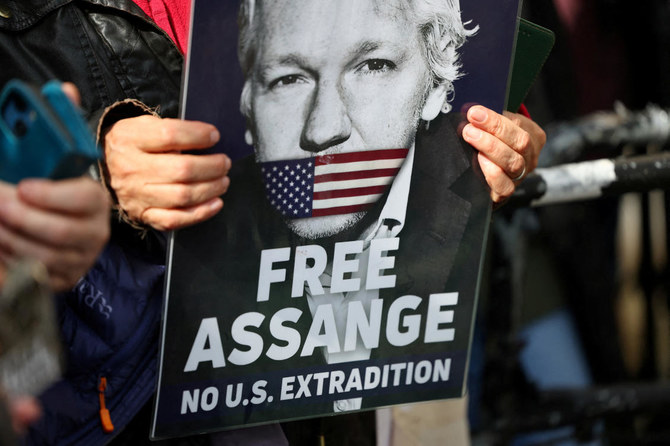LONDON: A British court has ruled that WikiLeaks founder Julian Assange can appeal against an order that he be extradited to the US on espionage charges.
Two High Court judges on Monday said Assange has grounds to challenge the UK government’s extradition order.
The ruling sets the stage for an appeal process likely to further drag out a years-long legal saga. Assange faces 17 espionage charges and one charge of computer misuse over his website’s publication of a trove of classified US documents almost 15 years ago. The Australian computer expert has spent the last five years in a British high-security prison after taking refuge in the Ecuadorian Embassy in London for seven years.
Lawyer Edward Fitzgerald said prosecutors had failed to guarantee that Assange, who is an Australian citizen and claims protections as a journalist for publishing US classified information, could rely on press protections of the First Amendment of the US Constitution.
“The real issue is whether an adequate assurance has been provided to remove the real risk identified by the court,” Fitzgerald said. “It is submitted that no adequate assurance has been made.”
The hearing in the High Court in London could end with Assange being sent to the US to face espionage charges, or could provide him another chance to appeal his extradition.
The outcome will depend on how much weight judges give to assurances US officials have provided that Assange’s rights won’t be trampled if he goes on trial.
Assange, 52, has been indicted on 17 espionage charges and one charge of computer misuse over his website’s publication of a trove of classified US documents almost 15 years ago. American prosecutors allege that Assange encouraged and helped US Army intelligence analyst Chelsea Manning to steal diplomatic cables and military files that WikiLeaks published.
Assange’s lawyers have argued he was a journalist who exposed US military wrongdoing in Iraq and Afghanistan. Sending him to the US, they said, would expose him to a politically motivated prosecution and risk a “flagrant denial of justice.”
The US government says Assange’s actions went way beyond those of a journalist gathering information, amounting to an attempt to solicit, steal and indiscriminately publish classified government documents.
In March, two judges rejected the bulk of Assange’s arguments but said he could take his case to the Court of Appeal unless the US guaranteed he would not face the death penalty if extradited and would have the same free speech protections as a US citizen.
The court said that if Assange couldn’t rely on the First Amendment then it was arguable his extradition would be incompatible with the European Convention on Human Rights, which also provides free speech and media protections.
The US provided those reassurances, but Assange’s legal team and supporters argue they are not good enough to rely on to send him to the US federal court system because the First Amendment promises fall short. The US said Assange could seek to rely on the amendment but it would be up to a judge to decide whether he could.
Attorney James Lewis, representing the US, said Assange’s conduct was “simply unprotected” by the First Amendment.
“No one, neither US citizens nor foreign citizens, are entitled to rely on the First Amendment in relation to publication of illegally obtained national defense information giving the names of innocent sources, to their grave and imminent risk of harm,” Lewis said.
The WikiLeaks founder, who has spent the past five years in a British prison, was not in court to hear his fate being debated. He did not attend for health reasons, Fitzgerald said.
Commuters emerging from a Tube stop near the courthouse couldn’t miss a large sign bearing Assange’s photo and the words, “Publishing is not a crime. War crimes are.” Scores of supporters gathered outside the neo-Gothic Royal Courts of Justice chanting “Free Julian Assange” and “Press freedom, Assange freedom.”
Some held a large white banner aimed at President Joe Biden, exhorting: “Let him go Joe.”
Assange’s lawyers say he could face up to 175 years in prison if convicted, though American authorities have said any sentence would likely be much shorter.
Assange’s family and supporters say his physical and mental health have suffered during more than a decade of legal battles, which includes seven years spent inside the Ecuadorian Embassy in London from 2012 until 2019. He has spent the past five years in a British high-security prison.
If Assange prevails Monday, it would set the stage for an appeal process likely to extend what has already been a long legal saga.
If the court accepts the word of the US, it would mark the end of Assange’s legal challenges in the UK, though it’s unclear what would immediately follow.
His legal team is prepared to ask the European Court of Human Rights to intervene. But his supporters fear Assange could be transferred before the court in Strasbourg, France, could halt his removal.
Judges Victoria Sharp and Jeremy Johnson may also postpone issuing a decision.
If Assange loses in court, he still may have another shot at freedom.
Biden said last month that he was considering a request from Australia to drop the case and let Assange return to his home country.
Officials provided no other details but Stella Assange said it was “a good sign” and Australian Prime Minister Anthony Albanese said the comment was encouraging.
















